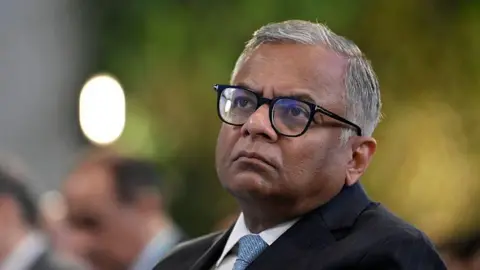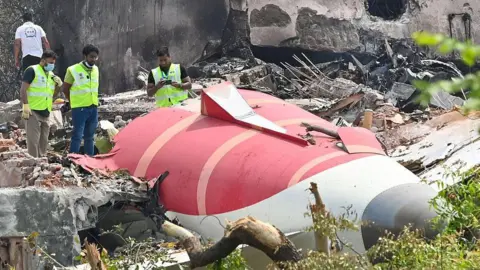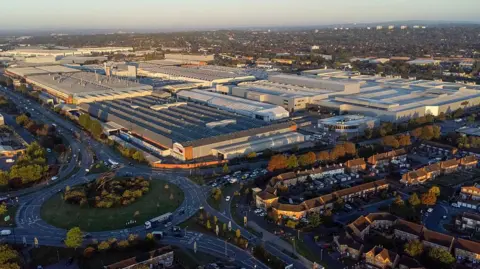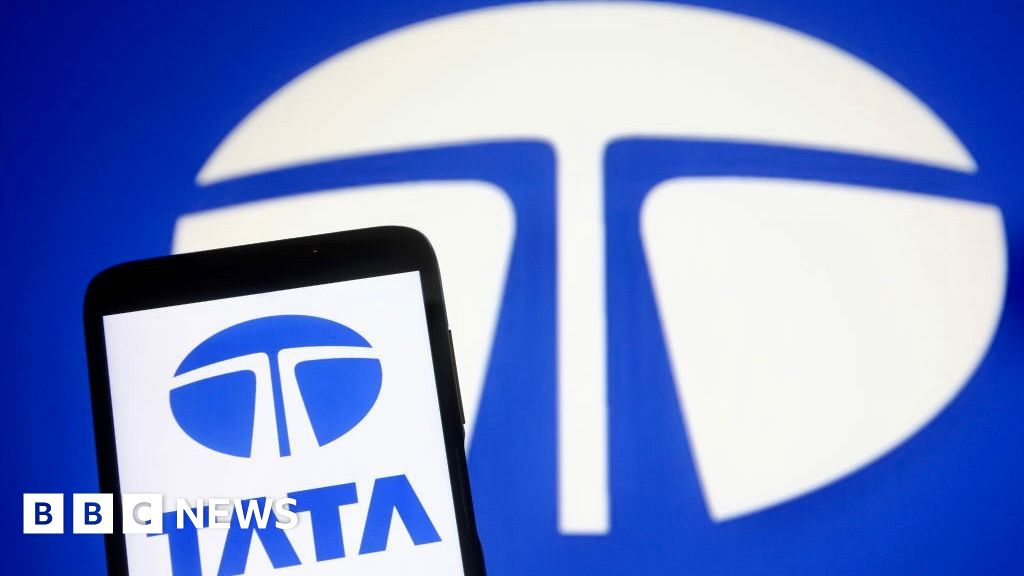Nikhil InamdarBBC News, Mumbai
 Getty Images
Getty ImagesA year after the death of Ratan Tata, the Tata Group – a gigantic Indian salt-to-steel conglomerate which he steered into a global, modern, technologically advanced enterprise – finds itself facing a plethora of crises.
The business empire, which owns iconic British brands such as Jaguar Land Rover (JLR) and Tetley Tea and makes the iPhone for Apple in India, is, yet again, a divided house.
For months, a boardroom power battle between trustees has exposed internal rifts that forced the government to step in and prevent a repeat of the very public legal tangle that engulfed the Tata empire in 2016, when its former chairman Cyrus Mistry was ousted from the group.
While ministers in Delhi appeared to have brokered an uneasy truce weeks ago, latest reports suggest that Mehli Mistry, a close confidant of Ratan Tata and a trustee on the board of Tata Trusts, has been ousted from his position. The BBC has not been able to independently verify this.
Prof Mircea Raianu of the University of Maryland who’s written a seminal history of the corporation, views the tussle as a “resurfacing of unresolved business” – or the core question of who runs the show at Tata, and how much control majority shareholders (the philanthropic arm Tata Trusts which owns 66% of the parent company, Tata Sons) can wield in making business decisions.
The Tata Group is uniquely structured, with controlling shares of the unlisted commercial holding company (Tata Sons) vested in a philanthropic organisation (Tata Trusts). While this has given the group tax and regulatory advantages, and allows it to carry out charitable activities, experts say it has also led to governance issues given its dual non-profit and commercial objectives.
The latest rift comes at a time when the Tatas are facing severe business headwinds while trying to expand into new growth areas like semiconductors and electric vehicles, as well as attempting to revive Air India – the ailing carrier they bought from the government in 2021 – following a tragic crash earlier this year.
So, what’s gone wrong?
 AFP via Getty Images
AFP via Getty ImagesThe Tatas have not publicly commented on the discord, but it is widely reported to stem from differences among trustees over board nominations, funding approvals and the public listing of Tata Sons – the holding company of 26 publicly listed Tata firms with a market capitalisation of some $328bn.
A source close to the Tata Group told the BBC on condition of anonymity that some of the trustees’ desire for greater influence in making strategic decisions at Tata Sons and picking nominees on its board is at the centre of the tussle. Tata Trusts has three nominees on the Tata Sons board.
“The Tata Trusts nominees have a veto right in major company decisions, but it is understood that theirs is basically a supervisory role, not an assertive one,” said the source. “However now, some of the trustees want more power to make commercial decisions.”
Another more significant point of contention is the desire of the SP Group – the largest minority shareholder in Tata Sons, with an 18% stake – to take the company public. While the former has been pushing hard for it, most Tata trustees are against the idea.
“There is fear that going public would dilute the trust’s decision-making capacity and long-term focus and expose Tata Sons to quarterly market pressures,” said the source. “This is especially because there are so many new businesses at a very nascent stage.”
But the SP Group has called its prospective public listing a “moral and social imperative” that would unlock value for Tata shareholders and improve transparency and governance at the company.
Neither Tata Sons not Tata Trusts have responded to detailed questions from the BBC. But according to Prof Raianu, the tussle highlights a very real dilemma for the group.
A public listing, he says, would be counter to what many giant conglomerates in the United States and Europe are increasingly doing – “opting for foundation ownership to promote stability and sustainability”, ironically, by looking to the Tatas as an example.
“But at the same time, private or closely held companies are indeed subject to less outside scrutiny, which can fuel conflict and harm reputation,” Prof Raianu adds.
 Hindustan Times via Getty Images
Hindustan Times via Getty ImagesThe conflict has already raised governance concerns and hit the brand image of what is arguably one of India’s oldest and most revered business houses, says publicist Dilip Cherian, who once worked closely with former Tata Sons chairman Cyrus Mistry.
“This just adds to the series of blows the Tata image has taken recently,” Mr Cherian told the BBC, referring to the devastating Air India crash earlier this year and the cyber-attack on a key unit of JLR which plunged the UK’s car production to a 70-year-low this September.
Further, TCS, the flagship software outsourcing company that contributes to nearly half the group’s revenues, has been plagued with its own set of challenges, including mass layoffs and the recent ending of a $1bn contract by retailer Marks & Spencer.
“These boardroom battles create further confusion. There will not only be anxiety about share performance, but questions among investors about who exactly they are dealing with at the Tatas,” said Mr Cherian.
 Bloomberg via Getty Images
Bloomberg via Getty ImagesAmid this turmoil, the tenure of N Chandrasekaran, the chairman of Tata Sons, has reportedly been extended.
“The chairman can continue doing his work, since this is not a rift within the board, but between the trustees. But it is an unnecessary distraction for him,” the source close to Tata Sons said.
But the Tatas are not new to firefighting crises. The group saw fierce battles in the 90s after Ratan Tata took over the group and attempted to modernise its operating structure. The conflict that broke out after Mistry’s ouster a few years ago is still fresh in many people’s memory.
There is however, a major difference this time, says Prof Raianu.
“Underperforming companies at the time were held afloat by TCS, which facilitated continuity. Before TCS, this role was played by Tata Steel.”
Right now – with TCS’s business model in a flux and its contribution to overall Tata group revenues coming under pressure – a similar “anchor” to the group is yet to emerge, making it harder for the group to fight such internal divisions.
“It is obviously destabilising and potentially destructive in the short term, but it is possible that a new and more transparent and accountable structure can emerge when the dust settles,” says Prof Raianu.
Follow BBC News India on Instagram, YouTube, X and Facebook.

